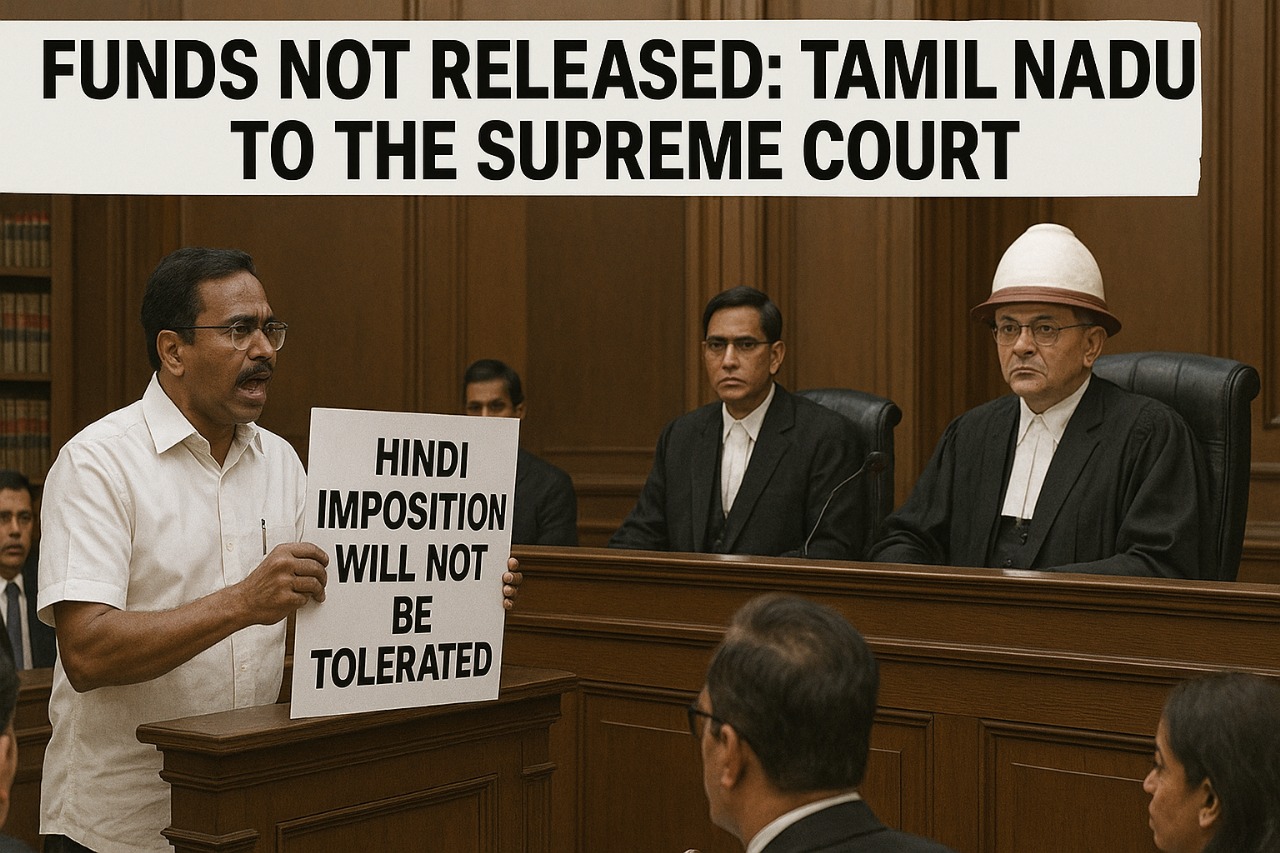INTRODUCTION
Due to the State’s unwillingness to implement the three-language policy, which includes Hindi, the Tamil Nadu government has petitioned the Supreme Court to disburse ₹2,151 crore in education money under the Samagra Shiksha Scheme (SSS) for the 2024–2025 fiscal year. By tying the distribution of funding to the State’s approval of the PM SHRI Schools program and the National Education Policy (NEP) 2020, the State has charged the Union government with coercive federal overreach.
The background and features of this specific pleading will be examined in this essay. It will examine the political and social facets of this dispute between the central government and the government of Tamil Nadu.
CASE HISTORY AND THREE LANGUAGE POLICY
In order to preserve its two-language policy of Tamil and English, Tamil Nadu is rejecting the three-language formula proposed in the National Education Policy (NEP). The state’s decision stems from its wish to maintain its current high enrollment rates as well as worries over the imposition of Hindi. Tamil Nadu’s education money has reportedly been withheld by the central government as a result. Tamil Nadu’s failure to use the NEP’s three-language formula has reportedly resulted in the central government withholding education funding from the state.
THE PLEADING
The lawsuit, which was filed through attorney Sabarish Subramanian, states that “such coercive tactics are neither legally permissible nor consistent with State legislation, particularly in light of the two-language formula adopted by the State.”
The entire amount of the lawsuit is ₹2291.3 crores, which includes 6% interest on the principal. Tamil Nadu has argued that the Center’s refusal to pay its “obligatory share” under the Samagra Shiksha Scheme has severely hindered the implementation of the Right of Children to Free and Compulsory Education Act, 2009 (RTE Act) and the constitutional rights of more than 43.94 lakh students, 2.21 lakh teachers, and 32,701 school employees in Tamil Nadu. The suit was filed under Article 131 of the Constitution, which gives the Supreme Court the authority to decide disputes between the Centre and the State.
According to the appeal, The lawsuit calls the action a “blatant violation of cooperative federalism” and claims that “the Defendant by withholding the Plaintiff’s entitlement… seeks to coerce and force the Plaintiff State to implement the NEP-2020 throughout the State.” The State claims that in its February 2024 meeting, the Ministry of Education’s Project Approval Board (PAB) approved ₹3,585.99 crore for Tamil Nadu under the SSS, of which ₹2,151.59 crore was the Center’s part based on the 60:40 cost-sharing formula.
However, it has been claimed that Tamil Nadu’s failure to sign the Memorandum of Understanding (MoU) for the PM SHRI Schools initiative and fully adopt NEP 2020 is the reason why not a single installment has been released thus far.
VIOLATION AND BINDING POWERS
According to the State, the Center’s action is against the RTE Act’s statutory framework as well as Articles 14, 21, 21A, 41, and 45 of the Constitution. It has asked for declarations that Tamil Nadu is not required to embrace the PM SHRI Schools program or NEP 2020 unless it chooses to do so. According to the request, the delay has affected infrastructure funds, teacher training, student entitlements like textbooks and uniforms, and salaries in government schools and dorms.
The State has asserted that the Centre has distributed Samagra Shiksha money to all States for the fiscal year 2024–2025, with the exception of Tamil Nadu, Kerala, and West Bengal, citing legislative answers to queries posed in the Rajya Sabha.
RIGHT TO FREE AND COMPULSORY EDUCATION
The RTE act 2009:
All children between the ages of 6 and 14 are guaranteed free and compulsory education under Article 21A of the Constitution. The entitlement of Children to Free and Compulsory Education Act, 2009, which describes the procedures for delivering this education, further carries out this entitlement. Ensuring children’s access to school, a vital first step in their growth and empowerment, is one way that the RTE empowers kids.
Benefit to Society: By guaranteeing education for all, the RTE helps create a society that is better educated and more skilled, which benefits the entire nation.
Legal Foundation: The RTE Act offers a solid legal foundation for carrying out and upholding the right to education.
Inclusion: The RTE guarantees equitable educational opportunities for kids from all backgrounds, including those with impairments.
CONCLUSION
The suit asks for a ruling that the Center’s conditional allocation of funds from the Samagra Shiksha Scheme to the execution of PM SHRI and NEP 2020 is unlawful, arbitrary, and unconstitutional.
Additionally, before each academic year begins, Tamil Nadu has asked the Union Government to provide its statutory share of 60% of the funding mandated by the Right of Children to Free and Compulsory Education Act, 2010.
Senior Advocate P. Wilson has resolved the plea, which was submitted by Advocate Sabarish Subramanian.
ABOUT THE AUTHOR

SAHIL YADAV, a law student at NLIU Bhopal, is a dedicated and passionate legal writer, who is keen to explore International law, Constitutional Law, Criminal Law, Forensic Psychology and publish research papers and articles on contemporary legal nuances and issues. He is also interested in the intersection of disciplines like history, psychology, political science, philosophy, and sociology with law.

